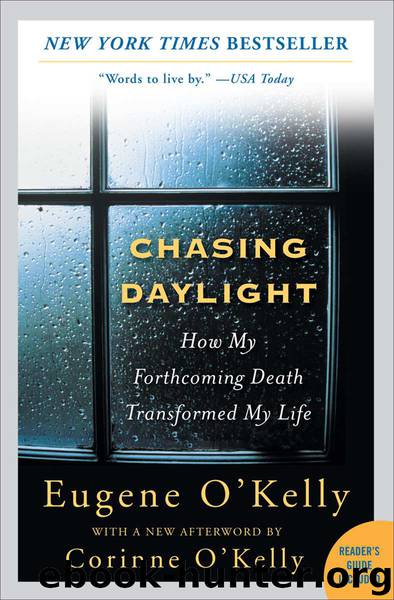Chasing Daylight: How My Forthcoming Death Transformed My Life by Gene O'Kelly

Author:Gene O'Kelly
Language: eng
Format: mobi
Publisher: McGraw-Hill Education
Published: 2007-10-14T14:00:00+00:00
THE GOOD GOOD-BYE
“IT IS NEVER GOOD DWELLING ON GOOD-BYES,”
SHE SAID. “IT IS NOT THE BEING TOGETHER THAT
IT PROLONGS, IT IS THE PARTING.”
—Elizabeth Asquith Bibesco,
“The Fir and the Palm”
My struggle to be in the present was not all-consuming. (Maybe that’s why it was a struggle.) There were other things to accomplish while I was able. The most important of these was saying good-bye.
About 13 years ago, around the time of my daughter Gina’s first birthday, my father was dying of lung cancer. I flew from California to Florida to see him for what turned out to be the last time. He was only 63, but he was pretty accepting of what was happening to him. (Actually, it’s wrong of me to say it that way—as if there’s an age after which someone would and should obviously be accepting of their impending death. I’m sure there are 88-year-olds and 103-year-olds who don’t accept what is happening to them, and never would. As is their right.)
I don’t remember my father conveying any formal wisdom in those last days we shared, about death or life or much else. We didn’t talk about God. I wasn’t asked to make any bedside promises, or to change my ways, or even to continue doing what I had always been doing. My dad was a pretty reserved guy. I do remember feeling that his acceptance, or seeming acceptance, of his death made it a little easier for me.
One of my tasks before I died was to “unwind,” or close—or, as I saw it, beautifully resolve—my personal relationships. But why did I want to? Why would anyone want to make some kind of part-symbolic, part-literal break with all the people he had enjoyed and loved? I soon found out that not everyone with whom I attempted closure understood why I was doing it, or agreed with how I was doing it. But as soon as I started the process, it felt right. And it made me think that other people, especially those with much more than three months left (for example, several decades), could benefit from the approach I took, or at least modify it to make it their own.
The four reasons why I did it:
I thought it would bring me and those with whom I was unwinding more pleasure than unhappiness (and, believe me, I realized just how much unhappiness would be involved).
It would occupy me in an important way, making me think deeply about things I felt I should think about, things most people probably should think about.
I was hard-wired by temperament and training for closure.
And last, and certainly not least,
I could.
Let’s start with the first reason: It would bring me and those with whom I was unwinding more pleasure than unhappiness.
This is really a two-parter. First, how could it bring me great pleasure? Simple. As I wrote down my list of people, those I intended to contact and plan a final encounter with, I stopped at each name and made myself recall, in the closest detail possible, all the moments the two of us had enjoyed together.
Download
This site does not store any files on its server. We only index and link to content provided by other sites. Please contact the content providers to delete copyright contents if any and email us, we'll remove relevant links or contents immediately.
They Both Die at the End by Adam Silvera(9818)
Thirteen Reasons Why by Jay Asher(8912)
The Space Between by Michelle L. Teichman(6942)
Suicide Notes by Michael Thomas Ford(4827)
Tuesdays with Morrie by Mitch Albom(4785)
Suicide: A Study in Sociology by Emile Durkheim(3024)
The Checklist Manifesto by Atul Gawande(2855)
Tuesdays With Morrie by Mitch Albom(2765)
In the Woods by Tana French(2599)
Bossypants by Tina Fey(2533)
Robin by Dave Itzkoff(2441)
Olive Kitteridge by Elizabeth Strout(2373)
No Ashes in the Fire by Darnell L Moore(2334)
Reservoir 13 by Jon McGregor(2305)
End of Days by Sylvia Browne(2191)
All Things New by John Eldredge(2163)
Bus on Jaffa Road by Mike Kelly(2160)
Scar Tissue by Anthony Kiedis(2138)
No Time to Say Goodbye(2119)
